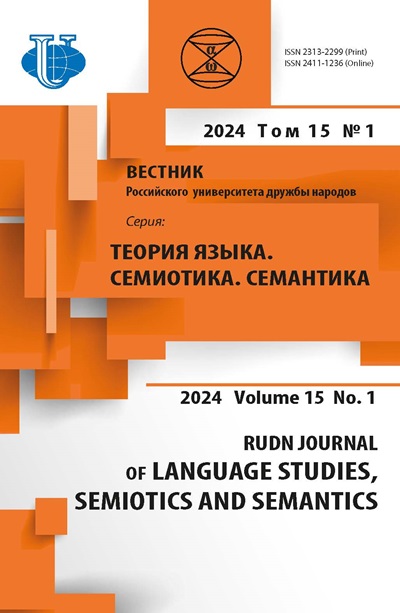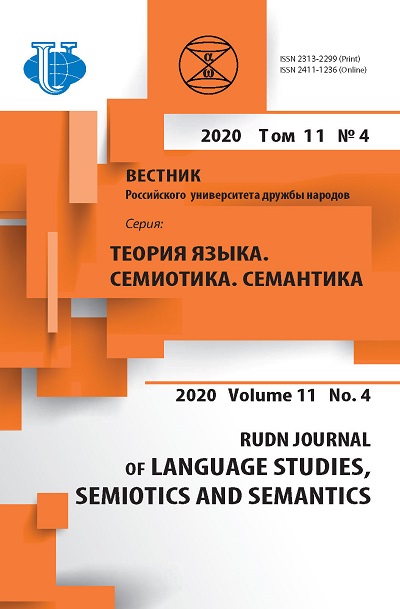Aphorism as an Object of Linguistics: the Main Properties
- Authors: Ivanov E.E.1
-
Affiliations:
- Mogilev State A. Kuleshov University
- Issue: Vol 11, No 4 (2020)
- Pages: 659-706
- Section: Functional grammar. Functional Semantics
- URL: https://journals.rudn.ru/semiotics-semantics/article/view/25045
- DOI: https://doi.org/10.22363/2313-2299-2020-11-4-659-706
Cite item
Full Text
Abstract
The article presents an attempt to establish and describe the main properties of aphorism as an object of linguistics. In modern linguistics, a number of researches are devoted to the study of aphorism as a phrase text and a fixed phrase. However, the concept of aphorism in linguistics does not have its own definition. In this regard, the analysis of the linguistically relevant properties of the aphorism that characterize its linguistic nature is of current importance. The purpose of the study is to determine and describe the minimum number of the most linguistically significant properties of an aphorism, to establish their obligatory / optional character, their specificity / generality (for aphorism and more than a word units close to it). Research methods - descriptive method, structural, semantic, functional, discursive, stylistic analysis, taxonomy. The material for the research was the statements in Russian, English, Belarusian, Polish, contained in written texts of different genres, as well as in compilations from various sources, in reference editions, in the title of which the term aphorism (or its derivative - aphoristic ) was used. The total number of analyzed units is over 50,000 from over 120 sources. As a result of the study, it was found that linguistically relevant properties of aphorism (differentiating it as an object of linguistics) are more than a word nature, one phrase structure, generalized meaning, nominative nature, discursive autonomy, textuality, reproducibility, stability, idiomatic nature, expressiveness of the verbal form. A number of properties coincide in aphorisms and phraseological units (more than word nature, reproducibility, stability, idiomatic nature), but none is obligatory for aphorism. Obligatory properties of aphorism are one phrase structure, generalized meaning, nominative nature, discursive autonomy. The main (differential) property of aphorism as an object of linguistics is the generalized meaning, which in relation to the expressed reality has a specific character - universal character. The introduction of linguistically relevant features of aphorism into science allows it to be defined in terms of linguistics as a one-phrase unit, nominative, discursively autonomous, predominantly more than a word units, reproducible, fixed unit that differs from all other more than a word units in one specific property - the generalized meaning (a universal generalization of reality). This property characterizes aphorisms as a variety of linguistic units (phrase texts or fixed phrases), determines their discursive autonomy and nominative nature, and manifests the categorical quality of their content plan - aphoristic nature.
About the authors
Eugene E. Ivanov
Mogilev State A. Kuleshov University
Author for correspondence.
Email: ivanov-msu@mail.ru
PhD of Philological Sciences, Associate Professor, Head of the Department of Theoretical and Applied Linguistics at the Faculty of Foreign Language
1, Kosmonavtov Str., Mogilev, Republic of Belarus, 212022References
- Ivanov, E.E. (2018). Linguistics of aphorism. A Reading Book. Minsk: Higher School Publ. (In Russ.).
- Ivanov, E.E. (2019). Aspects of empirical understanding of aphorism. RUDN Journal of Language Studies, Semiotics and Semantics, 10 (2), 381—401. doi: 10.22363/2313-2299-2019-10-2-381-401. (In Russ.).
- Akhmanova, O.S. (1966). Dictionary of Linguistic Terms. Moscow: Sovetskaja jenciklopedija. (In Russ.).
- Vasilyeva, N.V., Vinogradov, V.A. & Shakhnarovich, A.M. (1995). A short dictionary of linguistic terms. Moscow: Russkij jazyk. (In Russ.).
- Rosenthal, D.E. & Telenkova, M.A. (1985). Dictionary of Linguistic Terms. Moscow: Prosveshhenie (In Russ.).
- The English-Russian Dictionary of Linguistics and Semiotics (2003). A.N. Baranov & D.O. Dobrovolsky (eds.). Moscow: V.V. Vinogradov Russian Language Institute Press. (In Russ., in English).
- Ivanov, E.E. & Teslenko, E.G. (2015). Features of Anglo-American terminology on aphoristics. Acta Germano-Slavica, 6, 237—248.
- Russian language: encyclopedia (2008). Yu.N. Karaulov (ed.). Moscow: Bol'shaja sovetskaja jenciklopedija. (In Russ.).
- Belarusian language: encyclopedia (1994). A.E. Mikhnevich (ed.). Minsk: Belarusian Encyclopedia Publ. (In Belarusian).
- Ukrainian language: encyclopedia (2004).V.M. Rusanivsky & О.О. Taranenko (eds.). Kyiv: Ukraïn’ska enciklopedіja. (In Ukrainian).
- Prokhorov, Yu.E. (1979). Aphorism. Russian language: encyclopedia. Moscow: Sovetskaja jenciklopedija. p. 26. (In Russ.).
- Korolkova, A.V. (2005). Russian aphoristics. Moscow: Flinta & Nauka Publ. (In Russ.).
- Mechkovskaya, N.B. (2009). Genres of aphoristics and gradation of statements according to the degree of idiomaticity. Genres of speech, 6, 79—111. (In Russ.).
- Ivanov, E.E. (2018). Linguistic properties of aphoristic units. Scientific notes of Vitebsk State P.M. Masherov University, 27, 78—84. (In Belarusian).
- Ivanov, E.E. (2019). Generalization of meaning as a linguistic sign of aphoristic units. Minsk State Linguistic University Bulletin. Series 1: Philology, 3(100), 48—56. (In Belarusian).
- Ivanov, E.E. (2019). One-phrase form as a linguistic sign of aphoristic units. Bulletin of Mogilev State A. Kuleshov University. Series A: Humanities (History, Philosophy, Philology), 2 (54), 98—103. (In Belarusian).
- Ivanov, E.E. (2019). Idiomatic as a linguistic property of aphoristic units. Bulletin of the Maxim Tank Belarusian State Pedagogical University. Series 1: Pedagogy, Psychology, Philology, 2, 100—105. (In Belarusian).
- Ivanov, E.E. (2019). Nominativeness as a linguistic property of aphoristic units. Vesnik of Yanka Kupala State University of Grodno. Series 3: Philology, Pedagogy, Psychology, 9, 3, 76—83. (In Belarusian).
- Ivanov, E.E. (2019). Discourse autonomy as a linguistic property of aphoristic units. Herald of Polotsk State University. Series A: Humanity Science, 10, 100—103. (In Belarusian).
- Ivanov, E.E. (2019). Textuality as a linguistic sign of aphoristic units. Proceedings of Francisk Scorina Gomel State University Series: Humanities (History, Philology, Philosophy), 4 (115), 66—72. (In Belarusian).
- Ivanov, E.E. (2019). Reproducibility and fixability as linguistic characteristics of aphoristic units. Bulletin of the Mozyr State I.P. Shamyakin Pedagogical University, 1 (53), 119—125. (In Belarusian).
- Furstenberg, A.I. (1970). Aphorism. Great Soviet Encyclopedia: in 30 vol. Moscow: Soviet Encyclopedia Publ., 2, 434. (In Russ.).
- Fedorenko, N.T. & Sokolskaya, L.I. (1990). Aphoristics. Moscow: Nauka Publ. (In Russ.).
- Ivanov, E.E. (2006). Laconicism In Belarusian folklore: encyclopedia: in 2 vol. Vol. 2. Minsk: Belarusian Encyclopedia Publ. pp. 7—9. (In Belarusian).
- Ivanov, E.E. (2011). On the difference in the relationship of phraseological and aphoristic units to the word. Slavic phraseology in synchronicity and diachrony, 1, 254—258. (In Russ.)
- Dongak, S.B. (2003). Aphorism In Culture of Russian speech: encyclopedic dictionary. Moscow: Flinta & Nauka Publ. pp 90—92. (In Russ.).
- Gavrin, S.G. (1971). Aphoristic phraseology as a linguistic category. Scientific notes of Permian State University, 87, 3—23. (In Russ.).
- Gavrilova, E.N. (1986). Universal utterance and other generalizing statements. Philological sciences, 3, 56—62. (In Russ.).
- Vereshchagin, E.M. & Kostomarov, V.G. (1990). National-cultural semantics of linguistic aphorisms In Language and culture: linguistic and regional studies in teaching Russian as a foreign language. Moscow: Russian language Publ. pp. 71—80. (In Russ.).
- Prokhorov, Yu.E. (1977). Linguistic and regional description of aphoristics for educational purposes [dissertation]. Moscow. (In Russ.).
- Shmarina, V.I. (1975). Universal utterance and linguistic means of its expression (on the material of the English language) [dissertation]. Moscow. (In Russ.).
- Kuzmich, V. (2000). Burning verb: a dictionary of folk phraseology. Moscow: Green Age Publ. (In Russ.).
- Zhukov, V.P. (1991). Dictionary of Russian Proverbs and Sayings. Moscow: Russian language Publ,. (In Russ.).
- Ridout, R. & Witting, C. (1969). English Proverbs Explained. London: Pan Books.
- Shkraba, I. & Shkraba, R. (1987). Source word: Belarusian proverbs and sayings. Minsk. (In Belarusian).
- Ivanova, S.F. & Ivanov, E.E. (2007). Polish-Belarusian Paremiological Dictionary. Mogilev: Mogilev University Press. (In Polish, in Belarusian).
- Gracian, B. (1984). Pocket Oracle, or the Science of Prudence In Gracian, B. Pocket Oracle. Criticon. Moscow: Nauka Publ. 5—65. (In Russ.).
- Lepeshev, I.Ya. & Yakoltsevich, M.A. (2011). Explanatory dictionary of proverbs. Grodno University Press. (In Belarusian).
- Beregovskaya, E.M. (2015). Stylistics of one-phrase text (based on the material of Russian, French, English and German). Moscow: URSS & Lenand Publ. (In Russ.).
- Yarkho, V.N. (1982). Menander is a poet born again In Menander. Comedy. Fragments. Moscow: Nauka Publ. pp. 380—435. (In Russ.).
- Ashukin, N.S. & Ashukina, M.G. (1987). Winged Words: Literary Quotes. Figurative expressions. Moscow. (In Russ.).
- Fеdеrоwski, М. (1935). Lud białoruski na Rusi Litewskiej: materjały do etnografji słowiańskiej zgromadzone w latach 1877—1905: vols. I—IV. Vol. IV. Warszawа: Towarzystwo naukowe Warszawskie. (In Polish).
- Proverbs and sayings: in 2 vol. (1976). M.Ya. Greenblatt (comp.). Minsk: Science and Technology Publ. (In Belarusian).
- Ivanova, S.F. & Ivanov, E.E. (1997). Dictionary of Belarusian proverbs, sayings and winged words. Minsk: BFS Press. (In Belarusian).
- Lepeshau, I.Ya. (1993). Phraseological dictionary of the Belarusian language: in 2 vols. Minsk: Belarusian Encyclopedia Publ. (In Belarusian).
- Explanatory dictionary of the Belarusian literary language (1996). M.R. Sudnik & M.N. Cryuko (eds.). Minsk: Belarusian Encyclopedia Publ. (In Belarusian).
- Baranov, A.N. & Dobrovolskiy, D.O. (2008). Aspects of the theory of phraseology. Moscow: Znak Publ. (In Russ.).
- Mechkovskaya, N.B. (2019). Nominative and communicative levels of linguistic structure: to what extent do they have the properties of reproducibility and idiomaticity of units? Proceedings of the V.V. Vinogradov Russian Language Institute, 20, 147—159. (In Russ.).
- Dictionary of the Russian Language: in 4 vols. (1981—1984). A.P. Evgenieva (ed.). Moscow: Russkij jazyk. (In Russ.).
- Tarlanov, Z.K. (1999). Russian proverbs: syntax and poetics. Petrozavodsk: PSU Press. (In Russ.).
- Jankowski, M.A. (1971). Poetics of Belarusian proverbs. Minsk: Higher School Publ. (In Belarusian).
- Ivanov, E.E. (2016). Linguistics of aphorism. Mogilev: Mogilev University Press. (In Russ.)
- Ivanov, E.E. (2017). Aphoristic units in the Belarusian language. Mogilev: Mogilev University Press. (In Belarusian).
- Słownik aforyzmów a cytatów z literatury polskiej od XVI do XX wieku (2005). E.E. Ivanov (ed.). Mogilev: Mogilev University Press. (In Polish).
- Ivanov, E.E. (2011). Winged aphorisms in the Belarusian language: Foreign literature and VIII of the sources in folklore — XX century: the explanatory dictionary. Mogilev: Mogilev University Press. (In Belarusian).
- Ivanov, E.E. (2002). Paremiological Minimum and Basic Paremiological Stock (Belarusian and Russian). Prague: RSS Press. (In English).
- Ivanov, E.E. & Mokienko, V.M. (2007). Russian-Belarusian Paremiological Dictionary. Mogilev: Mogilev University Press. (In Russ., in Belarusian).
- English-Belarusian Paremiological Dictionary (2009). E.E. Ivanov (ed.). Mogilev: Mogilev University Press. (In English, in Belarusian).
- Ivanov, E.E. & Romanova, N.K. (2006). Belarusian-German Paremiological Dictionary. Mogilev: Mogilev University Press. (In Belarusian, in German).
- Ivanov, E.E. (2009). Runet anti-proverbs: typology and dictionary. Minsk: Law & Economics Publ. (In Russ.).
- Korolkova, A.V. (2018). Aphoristics in the context of Russian culture. Smolensk: Smolensk University Press. (In Russ.).
- Bredis, M.A., Lomakina, O.V. & Mokienko, V.M. (2019). The proverb in modern linguistics: definition, status, functioning. Bulletin of Moscow University. Series 19: Linguistics and intercultural communication, 3, 34—43. (In Russ.)
- Bredis, M.A., Dimoglo, M.S. & Lomakina, O.V. (2020). Paremias in Modern Linguistics: Approaches to Study, Text-Forming and Linguocultural Potential. RUDN Journal of Language Studies, Semiotics and Semantics, 11 (2), 265—284. doi: 10.22363/2313-2299-2020-11-2-265-284. (In Russ.).
- Paroemiology in Discourse: General and Applied Issues of Paremiology. Proverb in discourse and in text. Proverb and language picture of the world (2015). O.V. Lomakina (ed.). Moscow: Lenand Publ. (In Russ.).
- Paroemiology without borders: monograph (2020). E.N. Antonova, M.A. Bredis, T.E. Vladimirova, L.N. Gishkaeva, E.E. Ivanov, E.I. Zinoviev, D.D. Komova, O.V. Lomakina, A.S. Makarova, V.M. Mokienko, N.Yu. Nelyubova, E.K. Nikolaeva, E.I. Seliverstova, N.N. Semenenko, F.G. Fatkullina, R.Kh. Khairullina, Cao C., M.A. Bredis & O.V. Lomakina (eds.). Moscow: RUDN Press. (In Russ.).
- Lomakina, O.V. & Mokienko, V.M. (2019). Catch phrases in the modern cultural context. RUDN Journal of Language Studies, Semiotics and Semantics, 10 (2), 256—272. doi: 10.22363 / 2313-2299-2019-10-2-256-272. (In Russ.).
- Shulezhkova, S.G. (2002). Catchwords (winged words) of the Russian language, their sources and development. Moscow: Azbukovnik Publ. (In Russ.).
- Dyadechko, L.P. (2002). Winged words as an object of linguistic description: history and modernity. Kiev State T. Shevchenko University Press. (In Russ.).
- Dyadechko, L.P. (2006). «Winged words sound», or Russian eptology. Kiev National Taras Shevchenko University Press. (In Russ.).













